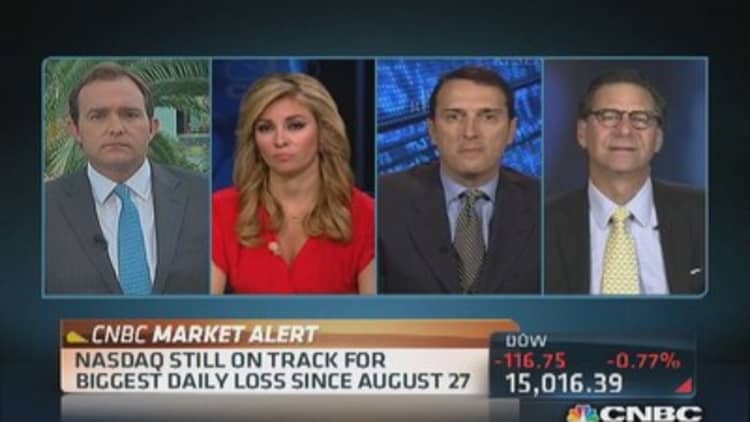U.S. short-term debt came under heavy pressure on Thursday as borrowing costs reached an 11-month high, and one analyst believes that investors should be warned that this volatility could spread into other assets markets.
"Take a look at the very short end of the U.S. Treasury curve and you see panic," Kathleen Brooks, a research director at Forex.com said in a research note on Thursday afternoon.
"The prospect of a default in the world's richest economy may sound preposterous, but investors are starting to price in the unexpected. It is worth keeping an eye on the very short end of the Treasury curve, as further nervousness here could spill into other markets."
The political deadlock in Washington entered its fourth day on Friday with traders having to survive without the release of U.S. nonfarm payrolls data. Growing fears that the budget deadlock could run on, potentially hampering attempts to solve a greater challenge – raising the U.S. debt limit ceiling – were also playing on investors' nerves. This must be agreed upon before October 17 if the U.S. is to avoid defaulting on its debts, with fears also surfacing of another credit downgrade last experienced in 2011.
The short end of the Treasury curve has seen the greatest movement. The yield on the one-month Treasury-bill reached 0.17 percent on Thursday, its highest level since November, climbing from 0.0355 percent on Monday. Meanwhile, three-month bills have risen from 0.0127 percent to 0.0304 percent and 1-year notes have also ticked slightly higher.
(Read More: Costs of insuring short-term US bonds rises on debt ceiling worry)
Speaking in Washington overnight, Christine Lagarde, managing director of the International Monetary Fund said that a failure to raise the debt ceiling before October 17 could hurt the global economy and warned that U.S. economic growth could drop below 2 percent this year.
Stocks have been relatively sanguine with the trading flat since the start of October. Riskier foreign exchange has managed to hold up fairly well, as have commodities, and the yield on the 10-year benchmark Treasury ticking lower to 2.6155 percent from 2.6554 percent since Monday.
(Read More: Treasury Bond Prices and Yields: CNBC Explains)
Jessica Hinds, an economist at Capital Economics said in a research note that some investors are switching out of very short-dated debt into bills with a longer maturity which would be less vulnerable to a missed payment by the U.S. government.
"However, the debt coupon payment is six weeks away and we strongly suspect that the impasse in Congress will have been resolved before then," she said.
(Read More: Why October will be good for bonds: Pro)
Chris Scicluna, an economist at Daiwa Capital told that CNBC that prices for longer-term paper were rallying due to to this switch into longer term paper and the belief that the U.S. Federal Reserve will now delay the "tapering" of its $85 billion-a-month bond buying program further, which has previously suppressed yields.
The higher yield on very short-term bills makes since if one sees a material risk of disruption to payments out on this paper, which is supposed to be highly liquid, he said.
"There is no panic, just resignation and/or irritation," he told CNBC. Instead of holding U.S. paper, Scicluna said that the "flight to quality" would mean beneficiaries would be German and Japanese sovereign debt.

Bill Gross, co-chief investment officer of Pacific Investment Management Co. (PIMCO) told CNBC that a German bond or a British gilt might be a better alternative having not defaulted on its a debt for a significant amount of time.
But Gross, speaking at a CNBC event on Thursday hosted by the UCLA Anderson School of Management at the Beverly Hilton hotel in Beverly Hills, believes there is a zero chance of a U.S. default.
(Read More: US bonds rise as Washington contest spurs safety bid)
"It's theatrics posed by politicians to get ratings or to get their way via legislation," Gross said. "It's not a realistic proposition."
Larry Fink, chairman and CEO of BlackRock, speaking at the same event agreed with Gross adding that the congressional dispute will end "very rapidly."
Nonetheless, some U.S. banks are stocking up on cash in case panicked customers start withdrawing their funds in case of a default, the Financial Times reports.
Banks are also holding meetings to discuss other steps, including possible free overdrafts for customers reliant on social security, the FT adds.
—By CNBC.com's Matt Clinch. Follow him on Twitter @mattclinch81


